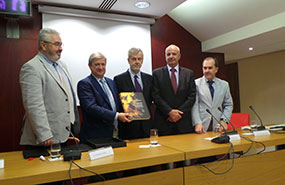CORREOS presents the book XXI Siglos de Comunicación en España
15 July 2016 |

- This work, which commemorates the 300th anniversary of CORREOS’ birth, tells the evolution of postal and telegraphic services from the beginnings of Civilization to our time
CORREOS has presented today the book titled XXI siglos de comunicación en España (21 Centuries of Communication in Spain) in the Auditorium of the “La Cilla” building, which belongs to the General Archive of the Indies in Seville. On July 8th, the postal company reached 300 years in existence, and decided to commemorate this anniversary with the publication of this book.
This work tells about the evolution of the postal and telegraphic services, from the origins of Civilization to our time, and how CORREOS has played the task which had been given to it, adapting itself to the times, in an agile way and reshaping its structure to innovation and to the technologies required for, without losing its postal nature, becoming the best provider of physical and digital communication services, and for packaging.
The event was introduced by CORREOS’ Chairman, Mr. Javier Cuesta Nuin, and was attended by the Director of the General Archive of the Indies, Mr. Manuel Ravina Martín, the Undersecretary for Philately, Mr. Modesto Fraguas Herrera, and by the two authors of the book, Mr. José María Sempere Luque and Mr. José Manuel López Bernal.
21 Centuries of Communication in Spain
Throughout its chapters, the work introduces us into the ways and costumes of the postal and telegraphic services along the different ages: Antiquity, when Romans setup the first postal systems on the Iberian Peninsula; the Middle Age, when kings, town councils, universities, and traders held an extensive epistolary communication; the Modern Age, when the Spanish postal system is created, which will be carried out for the most part during two centuries by members of the Tassis family.
At the start of the 18th Century the postal service was included within the Crown as a public rent, and in 1716 Don Juan Tomás de Goyeneche was appointed as Superintendent Judge and General Administrator of the mail offices of the Kingdom.
It continues up to Modern Times, when the Liberal State is born, which seeks its support and strength in the postal and telegraphic services, so that from then on, both services answer to the social needs and contribute to the country’s modernization.
There are also chapters about the postal service in the Spanish colonies in America during four centuries, taking the mail from one side of the Atlantic to the other, facilitating the administration and the interrelationship between cultures. A space is dedicated also to the birth of Philately, to its national organizations, to stamp collecting and to its peculiarities. As a coda, the book includes some Appendices regarding cultural institutions.
With the goal of making sure that the book’s content is rigorous with past and present events, special attention has been given to the selection of the most trustworthy and acknowledged authors. In the book have participated lectors and professors from a number of universities, such as the Complutense of Madrid, that of Alcalá de Henares, the Carlos III, or the Politécnica, as well as important researchers from the Spanish Royal Philatelic Academy, an institution whose activity is focused on studying philately and postal history.
In this project also took part employees from the postal company, which have dedicated their time to the study and to historical research about the postal and telegraphic services, as well as those in charge of the Postal and Telegraphic Museum, of the CORREOS’ Library and of the Documentation and Historical Studies Unit, which was in charge of coordinating the edition.
Correos/Grupo SEPI
Correos. belongs to Grupo SEPI, a corporate holding which includes a total of 16 state-owned companies in which it has a direct, majority shareholding participation, with a final workforce of about 73,000 professionals in 2014, and to which is attached the state-owned radio-and-television corporation, as well as one public foundation. Besides, it has direct minority shareholding participations in a further 10 companies, and indirect ones in more than 100 companies.
Correos is the biggest company in Spain, both in terms of its presence and territorial scope, with around 10,000 points for gaining access to its services. It distributes around 3,600 Million shipments per year, and it reaches daily 28 Million households, companies and institutions. It has a human team made up by more than 50,000 professionals who work to provide comprehensive solutions and a wide range of high-quality products adapted to the different customer categories, both in packaging and direct marketing, and in postal services based on the new technologies and financial services.







